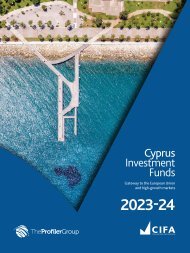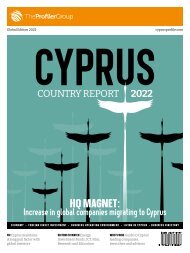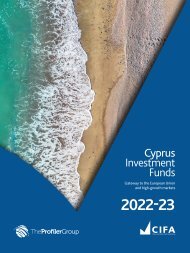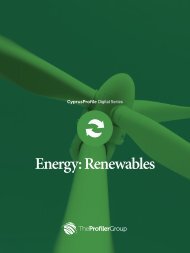2020 Cyprus Country Report
The 2020 Cyprus Country Report features in-depth articles on the economy, foreign direct investment, international trade and headquartering as well as detailed sector profiles and insights from Cyprus’ 100 most influential political, economic and business leaders shaping the future of their country and its industries.
The 2020 Cyprus Country Report features in-depth articles on the economy, foreign direct investment, international trade and headquartering as well as detailed sector profiles and insights from Cyprus’ 100 most influential political, economic and business leaders shaping the future of their country and its industries.
You also want an ePaper? Increase the reach of your titles
YUMPU automatically turns print PDFs into web optimized ePapers that Google loves.
To decrease<br />
dependence<br />
on heavy<br />
fuel oil for<br />
electricity<br />
generation<br />
and to diversify our energy mix<br />
we are investing in renewable<br />
energy sources and preparing<br />
the infrastructure for the<br />
use of natural gas. We also<br />
aim to meet national targets<br />
on clean, efficient energy and<br />
to upgrade technologies to<br />
decrease our carbon footprint.<br />
Our aim is to deliver a steady<br />
and secure supply of cleaner,<br />
greener, more affordable<br />
energy to the people of <strong>Cyprus</strong>.<br />
Panayiotis Olympios<br />
General Manager<br />
Electricity Authority<br />
of <strong>Cyprus</strong> (EAC)<br />
photovoltaic (PV) self-consumption in the<br />
Mediterranean region, while solving market,<br />
technical, grid and tariff issues without compromising<br />
grid stability and reliability.<br />
The University of <strong>Cyprus</strong> (UCY) is developing<br />
a 10 MWp photovoltaic park inside the United<br />
Nations buffer zone in Nicosia, supported by<br />
European funds. The first stage of the project will<br />
include 5 MWp of PV capacity with 2.35 MWh of<br />
battery storage, with plans to conduct testing for<br />
a blockchain program.<br />
SUSTAINABLE INNOVATION<br />
The University of <strong>Cyprus</strong> (UCY) is set to construct<br />
its second solar panel park ‘Apollon’ with<br />
assistance from the EAC to establish UCY as<br />
completely energy self-sufficient. Set to become<br />
the island’s first ‘green area’, the photovoltaic<br />
park will have a peak output of 10 MW coupled<br />
with battery storage of 2 MWh capacity, making<br />
it the island’s largest self-sufficient renewable<br />
energy facility. The University already covers<br />
around 15% of its electricity needs through<br />
photovoltaics with around 400 kWp already installed<br />
on a number of university buildings and<br />
the ‘Phaethon’ PV park made up of 1,645 solar<br />
panels with the capacity to produce 632,000<br />
kWh of electric energy annually.<br />
Central to this flagship project is the work<br />
of the University’s FOSS Research Centre for<br />
Sustainable Energy, which carries out cuttingedge<br />
research in the field of renewable sources<br />
of energy, with emphasis on solar energy, smart<br />
grids, smart buildings, grid integration and enabling<br />
technologies. FOSS has been highly successful<br />
in competing for funds, so far securing<br />
€16 million from more than 50 EU, national<br />
and industrial-funded projects. Well-known<br />
international players in the field of energy<br />
such as Honeywell, Hanwa Q Cells, Gantner<br />
Instruments, IBM amongst other leading international<br />
brands are already collaborating with<br />
FOSS and are testing their products in <strong>Cyprus</strong>.<br />
FOSS strives to promote cooperation<br />
between academia, industry and business<br />
sectors, as well as contributing to the transfer of<br />
knowledge from advanced European clusters to<br />
the region. A key aim is to make <strong>Cyprus</strong> a hub<br />
for solar innovation, technology transfer, industry<br />
start-ups and job creation where ideas can<br />
grow and achieve their full potential.<br />
ELECTRICITY MARKET LIBERALISATION<br />
Authority (CERA), to ensure that the electricity<br />
market in <strong>Cyprus</strong> is liberalised. CERA has<br />
worked towards the full opening up of the energy<br />
market and granting consumers the right to<br />
choose their own supplier. CERA’s proposition<br />
is a ‘net pool’ model, where the operations of the<br />
state power company, EAC, are unbundled and<br />
the production and supply operations separated.<br />
EAC production would then enter into bilateral<br />
agreements with suppliers for the sale of energy<br />
at regulated prices. CERA foresees establishing<br />
an electricity exchange where suppliers’ bids for<br />
quantities of electricity will be updated every<br />
half hour. The exchange will match supply and<br />
demand and fix the price for a contract. This<br />
will be operated by the Transmission System<br />
Operator (TSO). The target date to achieve electricity<br />
market liberalisation is December 2021, a<br />
move which will further open up the market for<br />
renewables, clean energy and lower prices.<br />
FOCUS ON EFFICIENCY<br />
Apart from the increasing foreign investment<br />
and a competitive energy market unfolding over<br />
the next few years, actions are being taken for<br />
the promotion of electric transport. This constitutes<br />
one of the cornerstones in the development<br />
of a zero-carbon economy, by encouraging<br />
greater use of electric cars and installing vehicle<br />
charging stations on roads across the island.<br />
Moreover, in 2021 the Ministry of Education,<br />
in cooperation with EAC, will proceed with<br />
thermal insulation of rooftops, as well as installations<br />
of PV systems in all public schools in<br />
<strong>Cyprus</strong>. The total capacity of those PV systems<br />
will be around 4.9 MW.<br />
<strong>Cyprus</strong> already has the resource of the sun<br />
and with new investment and projects in the<br />
pipeline, along with a government determined<br />
to develop renewable solutions, the country can<br />
truly harness its natural potential and become<br />
far more energy efficient in the years to come.<br />
Another economic benefit from high RES penetration<br />
is that according to estimates renewables<br />
have the potential to create between 11,000<br />
and 22,000 jobs in <strong>Cyprus</strong> by 2030. This is a<br />
significant number of new jobs in a country<br />
the size of <strong>Cyprus</strong> and would be a sign of a<br />
thriving new industry on the island with multiple<br />
positive knock-on effects in the economy.<br />
Decarbonisation is high on the agenda globally,<br />
and <strong>Cyprus</strong> is certainly making serious moves to<br />
reach its targets in the next decade. n<br />
Sector Profile<br />
Currently, <strong>Cyprus</strong> is in a transitional step before<br />
full electricity market liberalisation, which is<br />
being spurred on by the publication of a binding<br />
timetable by the <strong>Cyprus</strong> Energy Regulatory<br />
Discover more at www.cyprusprofile.com<br />
<strong>Country</strong> <strong>Report</strong> CYPRUS <strong>2020</strong> 87

















